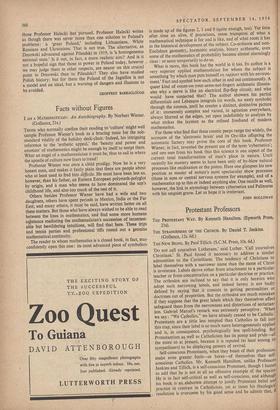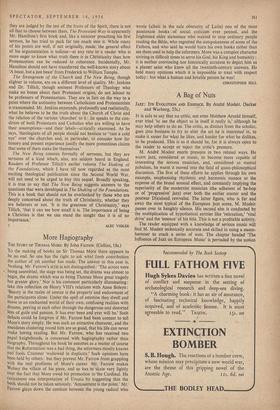Protestant Professors
THE NEW BEING. By Paul Tillich. (S.C.M. Press, 10s. 6d.) 'Do not call yourselves Lutherans,' said Luther. 'Call yourselves Christians.' St. Paul found it necessary to address a similar admonition to the Corinthians. The tendency of Christians to label themselves with a narrower name than the name of Christ is inveterate. Labels derive either from attachment to a particular teacher or from concentration on a particular doctrine or practice. The orthodox are inclined to say that it is only heretics who adopt such narrowing labels, and indeed heresy is not badly defined by saying that it consists in getting personalities or doctrines out of proportion. But the orthodox are much mistaken if they suppose that the great labels which they themselves affect safeguard them from the narrowness and distortions of sectarian- ism. Gabriel Marcel's remark was extremely perceptive : 'When we say : "We Catholics," we have already ceased to be Catholic.' Protestants are a little less tempted than Catholics to fall into this trap, since their label is so much more heterogeneously applied and is, in consequence, psychologically less spell-binding. But Protestantism as well as Catholicism has its pomp and pride—all the more so at present, because it is reputed (at least among its sympathisers) to be displaying powers of revival.
Self-conscious Protestants, when they boast of their profession, make even greater fools—or bores—of themselves than self- conscious Catholics. Mr. Kenneth Hamilton, unlike Professors Jenkins and Tillich, is a self-conscious Protestant, though 1 hasten to add that he is not at all an offensive example of the species• He is in fact self-critical as well as self-conscious, and although his book is an elaborate attempt to justify Protestant belief and practice in contrast to Catholicism, yet at times his theological resolution is overcome by his good sense and he admits that, if they are judged by the test of the fruits of the Spirit, there is not all that to choose between them. The Protestant Way is apparently
Mr. Hamilton's first book and, like a minister preaching his first sermon, he has tried to pack far too much into it. While many of his points are well, if not originally, made, the general effect of his argumentation is tedious—at any rate to a reader who is more eager to know what truth there is in Christianity than how Protestantism can be reduced to coherence. Incidentally, Mr. Hamilton should not have transferred the well-known story about `A beast, but a just beast' from Frederick to William Temple.
The Strangenels of the Church and The New Being, though slighter in volume, are on a different level of quality. Mr. Jenkins and Dr. Tillich, though eminent Professors of Theology who make no bones about their Protestant origins, do not labour to be professors of Protestantism. They are in fact on the way to a point where the antinomy between Catholicism and Protestantism is transcended. Mr. Jenkins expounds, profoundly and realistically, what he believes to be the truth about the Church of Christ and the relation of the various 'churches' to it :.he speaks to the con- dition of both Protestants and Catholics who are willing to have their assumptions—and their labels—critically examined. As he says, 'theologians of all people should not hesitate to "cast a cold eye" over the churches and, in particular, to consider how far history and present experience justify the more pretentious claims that some of them make for themselves.'
The New Being consists formally of sermons, but they are sermons of a kind which, alas, are seldom heard in England. Readers of Professor Tillich's earlier volume The Shaking of the Foundations, which I have till now regarded as the most exciting theological publication since the Second World War, will not need to be urged to buy this sequel. Broadly speaking, it is true to say that The New Being suggests answers to the questions that were developed in The Shaking of the Foundations. This is a book that should not be overlooked by those who are deeply concerned about the truth of Christianity, whether they are believers or not. 'It is the greatness of Christianity,' says Tillich, 'that it can see how small it is. The importance of being a Christian is that we can stand the insight that it is of no importance.'
ALEC VIDLER



































 Previous page
Previous page